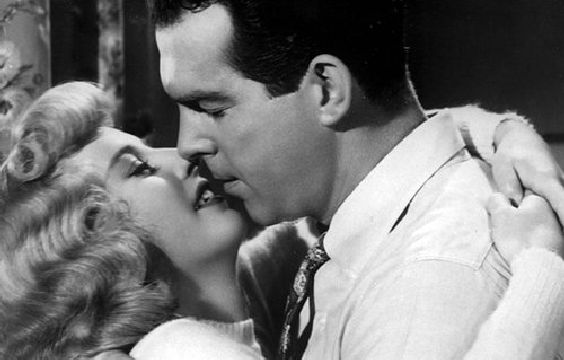Double Indemnity (1944) 
“Paramount’s terrific story of an unholy love, and an almost perfect crime!”

Director: Billy Wilder
Cast: Fred MacMurray, Barbara Stanwyck, Edward G. Robinson
Synopsis: An insurance representative lets himself be talked into a murder/insurance fraud scheme that arouses an insurance investigator’s suspicions.
Was there ever a femme more fatale that Phyllis Dietrichson (Barbara Stanwyck), the frustrated wife of a wealthy oilman (Tom Powers) in Billy Wilder‘s Double Indemnity? This woman has venom in her veins and knows just what to do to ensnare any man she desires. She’s dangerous, and vaguely slutty – check out that ankle bracelet – and it’s these qualities, together with the fact that she has designs on her irascible husband’s money, that makes her so desirable to a cocksure man like Walter Neff (Fred MacMurray). Neff’s a hotshot insurance salesman, easygoing and charismatic, and not afraid of openly flirting with the wives of his clients. And when he gets the signal from Phyllis, he doesn‘t hang about, even though he‘s initially turned off by her transparent plan to take out accident insurance on her husband without him knowing and then knock him off.
Phyllis has the looks, but Neff’s the one with the brains and the inside knowledge, and he devises a plan designed to outwit his boss, claims manager Barton Keyes (Edward G. Robinson). Keyes is an eccentric little man who smokes cheap cigars – which Neff frequently lights for him – and has no life beyond his work. He sees himself as something of a father figure to Neff, and Neff realises that if he can fool Keyes then he’s home and dry. The plan is ingenious but, like any plan, it’s vulnerable to chance, to a stranger being where they shouldn’t be. Also, Phyllis has a past that she’s kept from Neff…
Double Indemnity is one of Hollywood’s greatest crime thrillers – possibly it’s greatest. Its plot is so tight and ingenious that James M. Cain, the author of the book on which it’s based, admitted that, had he dreamed up some of the changes Wilder and co-writer Raymond Chandler made to his story when he was writing the book he would have added them himself. Praise, indeed. But it’s not just the plot that makes this movie great – there’s plenty of dud movies been made out of perfectly serviceable plots. It’s the style with which it’s all put together.
Rooted deep within the Noir genre, Double Indemnity is a movie that seems to live in the shadows, creating an atmosphere that is both intimate and deadly; assignations, both romantic and larcenous, take place behind blinds through which filtered light thinly illuminates slivers of dusty sunlight. It’s an environment in which the sultry Mrs Dietrichson seems right at home. Even when forced to wear an ill-chosen blonde wig, Barbara Stanwyck breathes life into this deadly creature, makes her believable, makes you want to reach out and touch her. She’s poison in a pretty bottle, and Stanwyck’s one of the few actresses working in Hollywood then or since who could have pulled the role off so superbly. Witness the look on her face as Neff murders her husband, who’s sitting in the passenger seat of the car she’s driving. Wilder wisely keeps the murder off-screen, choosing to focus instead on Phyllis. Stanwyck’s expression barely changes: there’s no arch satisfaction that her plan is finally happening, no anxiety, no nerves, no fear – just a barely perceptible pursing of her lips, and the faintest softening of her gaze. It’s a beautifully realised moment – one that might have been instigated by the director, for sure, but which relied on Stanwyck’s artistry to achieve greatness.
Perhaps a little surprisingly, Fred MacMurray, who was previously more associated with light comedies, proves to be more than a match for Stanwyck. As the hapless Neff, he exudes the cocky over-confidence of a man who sees women as a commodity placed on earth for the pleasure of him and his kind. He’s a clever man, good at what he does – but he’s coasting, just killing time until that one big life-changing score falls into his lap. That’s what Keyes understands, and why he offers Neff a job as his assistant, and it’s why Neff’s such a pushover for Phyllis.
MacMurray reveals a heretofore unsuspected toughness that is wholly convincing as Neff. As each intriguing plot twist turns the screw that little bit tighter, you can see that cocksure expression slowly evaporating, replaced by a tightening of his features which is covered by a patina of perspiration. MacMurray’s so good in the role that when he keeps his expression neutral you can actually see what he’s thinking behind the mask.
And those twists keep piling up with increasing frequency which, let’s face it, is where most of the fun is to be gained from any murder plot. We might marvel at the ingenuity of the plotters, but we pay our money to see how their plot slowly falls apart – which is an art in itself. The screenplay was co-written by Raymond Chandler, and many of the lines resonate with that hard-boiled conciseness familiar from his novels. After killing Dietrichson, Neff strolls down to the local drug store to establish his alibi. In his narration, spoken in the form of a confession on a Dictaphone to Keyes, Neff says ’I couldn’t hear my own footsteps,’ and in those six words sums up the fundamental changes that have taken place within Neff’s own character that lesser writers would have taken half a page to establish. He’s become a stranger to himself, unrecognisable and alien. Similarly, the revelation from Lola (Jean Heather), Dietrichson’s young daughter, that she spied Phyllis trying on a black hat and veil in her bedroom before Dietrichson’s death provides us with a chillingly succinct insight into the cold heart of Phyllis’s character.
(Reviewed 29th August 2012)
httpv://www.youtube.com/watch?v=yKrrAa2o9Eg
